New Jersey's plastic consumption triples after plastic bag ban enacted, study shows

Plastic consumption in New Jersey tripled despite the state's 2022 plastic ban meant to and address the "problem of plastic pollution," according to a study from a business-research firm.
The study found that the state's law banning single-use plastic bags led to a 60% decrease in the total bag volume, according to analysis from the Freedonia Report, MarketResearch.com's business research division.
However, as consumers started searching for alternatives and purchasing plastic reusable bags, the state saw plastic consumption triple, largely because of the material used in the alternative bags, the report shows.
"Most of these alternative bags are made with non-woven polypropylene, which is not widely recycled in the United States and does not typically contain any post-consumer recycled materials," the report states.
The ban, which took effect in May 2022, prevented large retailers, groceries and food service stores from distributing the plastic bags, reports Fox29.
Democratic Gov. Phil Murphy, upon signing the bill, said the measure would address New Jersey's "most problematic forms of garbage" and "help mitigate climate change and strengthen our environment for future generations,"
Stores eliminate plastics bags:Aldi eliminates plastic shopping bags in all 2,300 US grocery stores
The ban also affected retailers, with some stories reporting an increase in sales because of the need for alternative bags.
"An in-depth cost analysis evaluating New Jersey grocery retailers reveals a typical store can profit $200,000 per store location from alternative bag sales," states the study. "For one major retailer, this amounts to an estimated $42 million in profit across all its bag sales in NJ."
Do plastic bans help?
Single-use plastic bans are a way to curb the pollution and emissions created by the production of the material, according to the National Conference of State Legislatures.
But, the search for alternatives to carry groceries and other products from the store leads to the purchase of products that increase the pollution caused by manufacturings the bags.
A study published by Environmental and Resource Economics also suggests that plastic bag bans can lead to an increase in purchases of garbage bags.
"We estimate that [carryout grocery bag] regulations lead to an average increase in purchased plastics of 127 pounds per store per month," states the study.

Disclaimer: The copyright of this article belongs to the original author. Reposting this article is solely for the purpose of information dissemination and does not constitute any investment advice. If there is any infringement, please contact us immediately. We will make corrections or deletions as necessary. Thank you.







